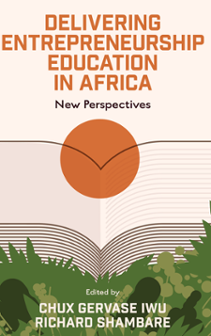Economic and Management Sciences (EMS)
, 59
Educators
, 44
educator-centred approaches
, 13
educator-dominated pedagogical strategies
, 5
Effectiveness of entrepreneurship education
, 246, 252
Entrepreneurial cognition
, 19–20
Entrepreneurial desirability
, 203, 209
Entrepreneurial education
, 80, 150–152, 162
data analysis
, 189
data sources and sampling
, 187
demographic analysis
, 191
findings
, 191–192
hypothesis testing
, 192
instrument development
, 187
literature review and theoretical basis of study
, 180–186
path coefficients
, 192
recommendations
, 194–195
reliability and validity
, 189–191
research design
, 186–191
research objectives and questions
, 180
swimming pool
, 186
Entrepreneurial feasibility
, 211
Entrepreneurial goals, effect of entrepreneurship education on
, 248
Entrepreneurial intentions
, 2–3, 204–205
Entrepreneurial programmes in higher education
, 78
methodology
, 89–90
problem statement
, 78–79
results
, 91–93
teaching and learning about entrepreneurship
, 80–81
teaching and learning for entrepreneurship
, 81
teaching and learning strategies and approaches in entrepreneurship education
, 79–82
teaching and learning through entrepreneurship
, 82
visionary constructive competencies
, 82–86
Entrepreneurial thinking
, 222
CHAT
, 225–228
findings
, 228–238
and first-year entrepreneurship students
, 223–225
students’ agency influencing
, 233–236
students’ extended communities influencing
, 236–238
Entrepreneurs
, 40
unlocking representation of entrepreneurs through poststructuralism
, 61
Entrepreneurship
, 2, 20, 122, 246, 258–259
implementation and evaluation, review of literature on entrepreneurship curriculum design
, 124–129
internship programme
, 45–47
as process of discovery
, 11–12
in South Africa
, 39
teaching and learning about
, 80–81
teaching and learning for
, 81
teaching and learning through
, 82
theories
, 203–204
Entrepreneurship education (EE)
, 3–4, 12, 57, 59, 78–79, 83, 89–91, 93, 123, 129, 246–247, 249, 257
advancement of entrepreneurship education in South Africa
, 257–258
applying innovation to
, 156–158
assess efficiency
, 260–261
choose faculty/appropriate academic staff
, 260
classrooms
, 15
comparing respondents’ entrepreneurial desirability and feasibility perceptions, with students’ profile, satisfaction level with modules and self-assurance
, 208–209
comparing respondents’ perceptions of entrepreneurial attributes statements, with profile, satisfaction level with modules and self-assurance
, 209–211
comparing respondents’ perceptions of entrepreneurship education, with profile, satisfaction level with modules and self-assurance
, 207–208
create curriculum
, 259–260
critical questioning and hypotheses development
, 17–18
curriculum design
, 125–126
data collection and analyses
, 205–206
design and methods
, 205–206
determine your goals
, 259
developing and delivering mode of entrepreneurship education curriculum
, 259–261
effectiveness of
, 252
entrepreneurial intention
, 204–205
entrepreneurship as process of discovery
, 11–12
entrepreneurship education in South Africa
, 257
effect of entrepreneurship education on entrepreneurial goals
, 248
entrepreneurship theories
, 203–204
evaluation of first programme
, 129–132
evaluation of programmes
, 249
evaluation of second programme
, 133–136
evaluation requirements
, 250
findings
, 206–211
flipped classrooms
, 15
flipped critical pedagogy in digitally enhanced learning environments
, 16–18
Ghana’s social enterprises and
, 164–167
Hegelian dialectic
, 9–10
implications
, 19–21
importance of
, 248
market analysis
, 259
overview of literature
, 201–204
practical contribution
, 20–21
with profile, satisfaction level with modules and self-assurance, respondents’ perceptions of
, 207–208
programmes in Nigeria
, 123–124, 129, 136
proposed conceptual framework
, 18–19
provide curriculum
, 260
question
, 67–69
recommendations and suggestions for further research
, 69–70
related literature
, 12–16
research methodology
, 61–62
respondents’ profile
, 206–207
results and interpretation
, 62
role of universities in arts, cultural and creative
, 43–44
in schools
, 59
SDG and entrepreneurship
, 258–259
Socratic dialogue
, 7–9
study limitations
, 21–22
study limitations and future research
, 213
study recommendations
, 212–213
teaching and learning strategies and approaches in
, 79–82
teaching approaches
, 13–14
textbooks in South Africa
, 60
theme
, 62–67
theoretical contribution
, 19–20
theoretical development
, 6–12
theoretical model of
, 252–255
tourism entrepreneurship in relation to scholarship of teaching and learning
, 201–202
TPB
, 252–255
transformative agency
, 10–11
transformative agency and transformative pedagogy
, 15–16
unlocking representation of entrepreneurs through poststructuralism
, 61
USA point of view on
, 256–257
youth unemployment and
, 202
Erikson’s seminal theory of psychological development
, 58
Extended Curriculum Programme (ECP)
, 227
